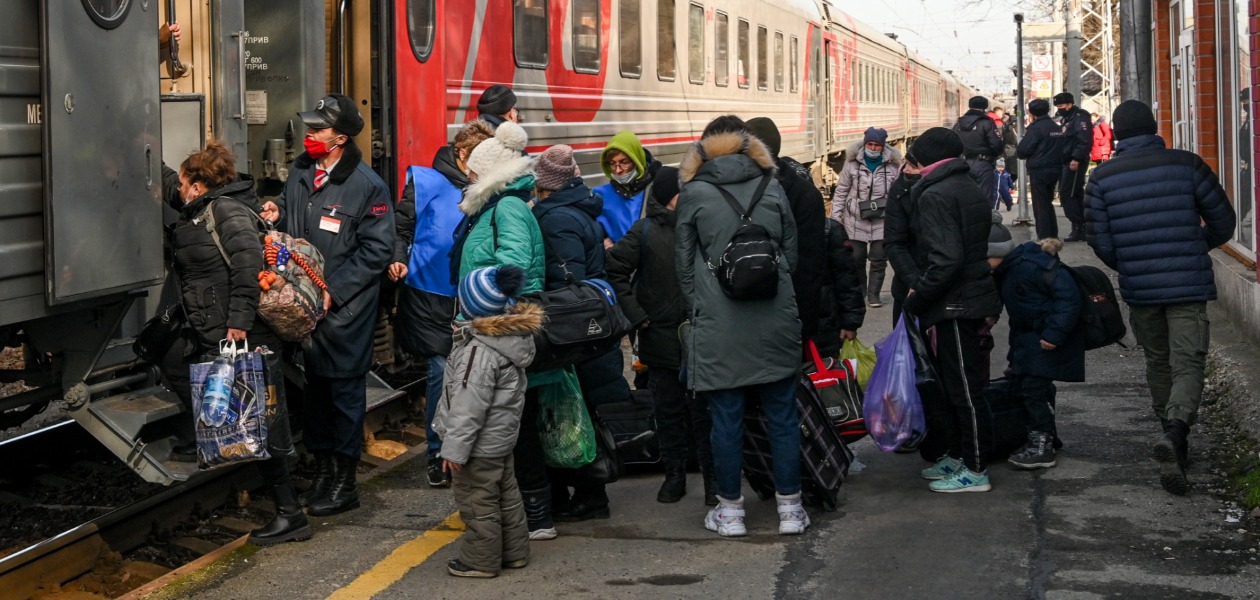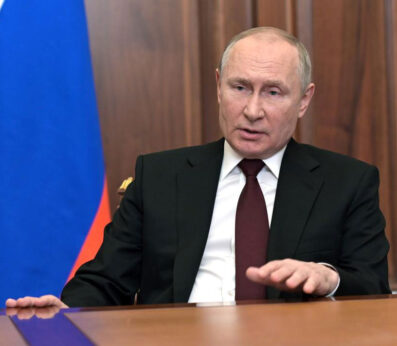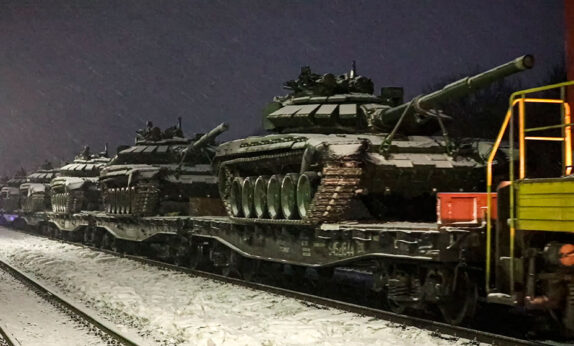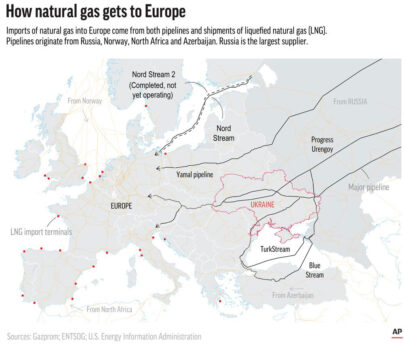
The big news regarding the Russia-Ukraine conflict over the President’s Day holiday was that Russia’s President Vladimir Putin ordered troops to enter two separatist regions of Ukraine for “peacekeeping” purposes. There has been no confirmation yet that Russian troops, in addition to those that may or may not have already been in those regions, have actually moved into the areas yet.

Russia’s order has been almost universally described by Western media as ratcheting up tensions and bringing the Ukraine crisis closer than ever to actual war. Putin ordered the troops to move in just hours after he recognized the independence of the Donetsk and Lugansk People’s Republics in the Donbass region of eastern Ukraine.
In the last two days, there has been extensive shelling of the areas by the Ukrainian Army, and at least 60,000 civilians have thus far evacuated across the border into Russia. Since 2014, Ukrainian troops are estimated to have killed 15,000 or more Russian-speaking civilians in the two breakaway republics.
Although cable networks carried parts of Putin’s speech on Monday, none carried the entirety of his remarks, which were a mix of nationalist territorial claims, revisionist history, and legitimate charges of Ukrainian hostility in the Donbass.
The press gave heavy attention to his provocative claim that Ukraine lacked “real statehood,” a position seen as justification for a potential Russian absorption of the country. The media provided little to no analysis of the details of Putin’s assertion, however.
In his speech, Putin laid out his own version of the history of Russian-Ukrainian relations, putting blame on Communist leaders of the Soviet era for upsetting “the historical destiny of Russia and its peoples” by focusing on the “right of nations to self-determination” in the years after the Bolshevik Revolution of 1917.
“Lenin’s principles of state development were not just a mistake,” Putin said, “they were worse than a mistake.” He said these principles, along with subsequent shifting of the internal territorial boundaries of the USSR by other leaders, led to what he implied were artificial divisions between Russians and Ukrainians. Putin said that governing such a vast territory as a “confederation,” as was the case in the Soviet period, was “far removed from reality” and the “tradition…of the Russian Empire.”
With the spotlight on Putin’s comments concerning territory and statehood issues, few U.S. media outlets provided much attention to his charge that the government in Kiev had organized “a terrorist underground movement” in the Donbass region and Crimea. Nor was note taken of the plans of Ukraine’s government, according to its own strategists, to execute a war “with foreign military support” against Russia and the breakaway regions in eastern Ukraine.
President Joe Biden, waiting barely a minute after Putin finished speaking, announced sanctions against the two republics of Lugansk and Donetsk. He is expected to announce new severe sanctions against Russia shortly.
It should be clear that even though they don’t involve “troops on the ground,” sanctions are, themselves, also an act of war. Russia has been living with a variety of painful sanctions imposed by the U.S. for eight years now already.
The raising of the stakes and the raising of tensions resulting from Putin’s announcement ordering in “peacekeepers” Monday are, at least in part, a predictable result of NATO, the U.S., and Ukraine ignoring a number of legitimate security issues repeatedly mentioned by Russia for the last 30 years, including and especially Russia’s objection to the eastward expansion of NATO and the placement of offensive weapons on Russia’s borders.

The tension-raising announcement by Russia Monday did not, of course, come out of the blue. It followed months of bad faith negotiations by the West. Rather than implementing the 2014 Minsk Protocols under which the parties agreed to autonomy for Lugansk and Donetsk, for example, the West only offered Russia the right to inspect offensive missiles placed on its borders. To add insult to injury, while they were offering that, they established three additional bases with such missiles, two in Slovakia and one in Poland.
They also ignored French President Emmanuel Macron’s suggestion of a “Finlandization” solution for Ukraine whereby Ukraine, like Finland during the Cold War, selects its own form of government and remains independent while it pursues a nonaligned neutral foreign policy with no offensive weapons stationed on its soil and aimed at Russia.
Another unfortunate result of where all of this leaves us is that, unless all sides pull back from the brink and negotiate seriously, we already have an unwanted winner in this war.
The winner is the multi-national fossil fuel industries based in the U.S. The CEOs must have been rubbing their palms together with glee when they heard Biden warn Americans they will have to pay higher prices for energy as the U.S. imposes sanctions on Russia. Futures for gasoline and home heating oil were already up on Monday and Tuesday. Those companies hate the fact that Russia has been supplying Europe’s energy needs. They want to sell Europe their gas, fracked in the U.S., even though that gas will be far more expensive for Europe than the Russian gas.

Western gas and oil companies got part of what they wanted Tuesday morning when German Chancellor Olaf Scholz announced that the Nord Stream 2 pipeline, a joint Russian-German project completed last year and due to become operational by mid-2022. Scholz’s decision will directly benefit the gas giants by keeping Europe’s consumption of cheap Russian gas capped at current levels, or even less. That means more profits from European purchases of fracked U.S. gas.
The Ukrainian government was also excited by the pipeline blockade, as a major part of its annual revenues come from acting as middleman fees for current overland pipelines between Russia and Europe. Foreign Minister Dmytro Kuleba praised Germany’s move as “a morally, politically, and practically correct step in the current circumstances.”
Americans, meanwhile, will be expected to pay more to help offset the costs to Europeans of an obscene profit-making machine operated by the fuel monopolies—a machine that has no concern whatsoever for Ukrainians, Russians, or Americans. The other winners of this war, of course, are the arms and munitions companies who drive up the U.S. military budget and take money from the social programs urgently needed at home.
In the most serious crisis to envelop Europe since the Cold War, NATO has proven, once again, that it cannot meet the security needs of Europe and that a new security framework for the continent is sorely needed. An organization that takes in all of Europe, including Russia, on an equal basis, would be a sane and sensible way to go.
FURTHER COVERAGE:
> Pipeline ploy: How U.S. natural gas interests are fueling the Ukraine crisis
> Ukrainian fascists say they will sabotage any peace deal with Russia
> U.S. ramps up war talk as it points more missiles at Russia













Comments